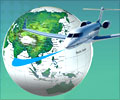
"These travellers will be asked, upon vaccination by a number of travel clinics, if they would like to participate and send stools to us for a year after their return from the tropics," Van Hattem told AFP.
He said there has been a rise in antibiotic resistant intestinal bacterial infections in the Netherlands and researchers wanted to see whether these bacteria hitch a ride with travellers who pick them up in exotic destinations.
The team further want to study whether these bacteria are transmitted to non-travelling relatives upon return home to the Netherlands, known for its strict control of the use of antibiotics for fear of building up resistance.
All volunteers will receive a home DIY-kit with swabs and a special plastic "safe bag" in which a swab sample will be sealed and placed in an envelope with a return address to Erasmus Medical Centre in Rotterdam.
Participants are asked to send three to six samples over the course of a year, with researchers hoping to publish their findings about 30 months afterwards.
Advertisement
Participants won't go away empty handed though.
Advertisement
Fokke & Sukke are two crudely drawn but hugely popular Dutch cartoon characters known for their politically incorrect views and often scatological sense of humour.
"Most people find anything to do with poop quite disgusting. So with this cartoon we hope to put a bit of humour back into the study," Van Hattem said.
Source-AFP








